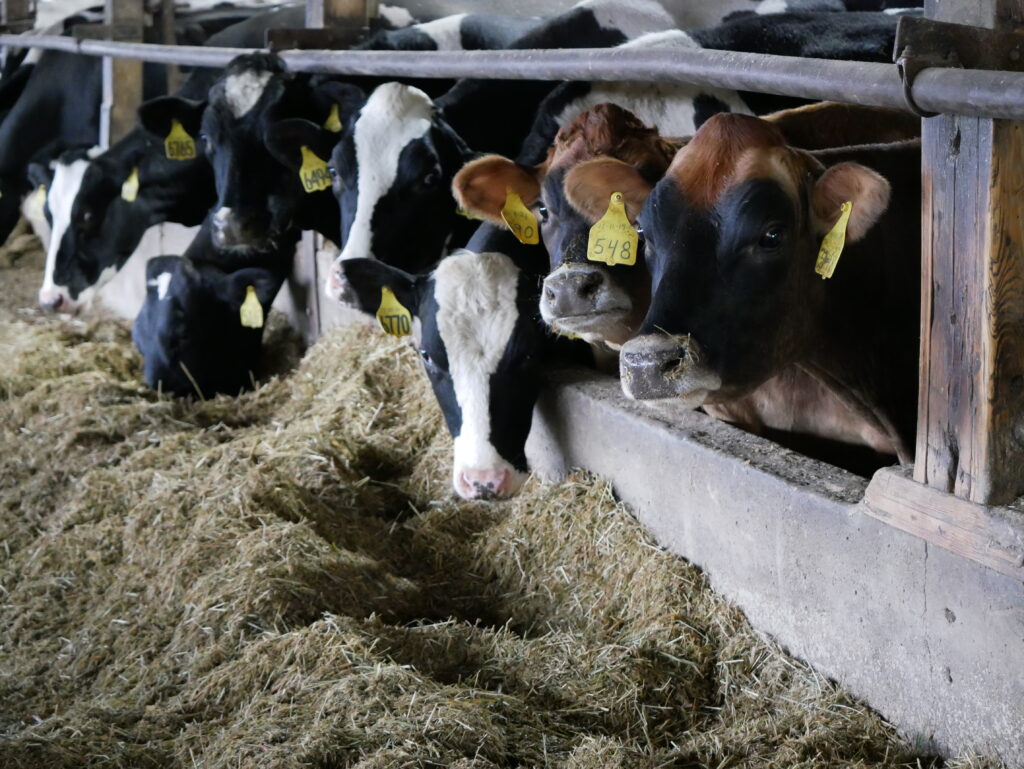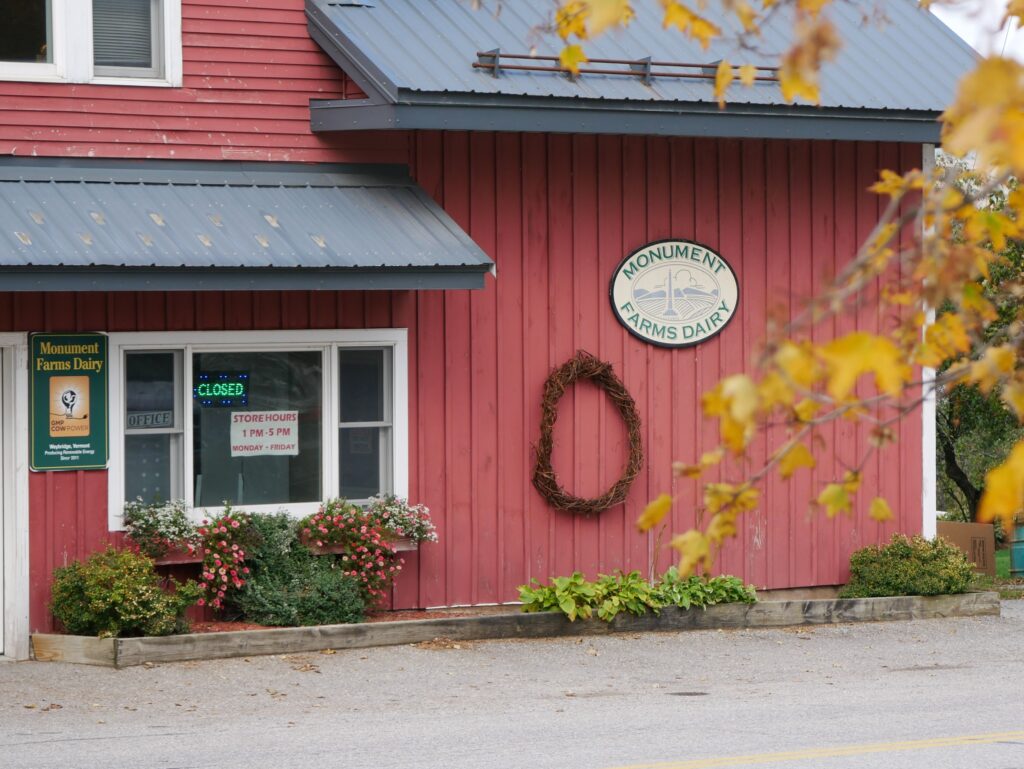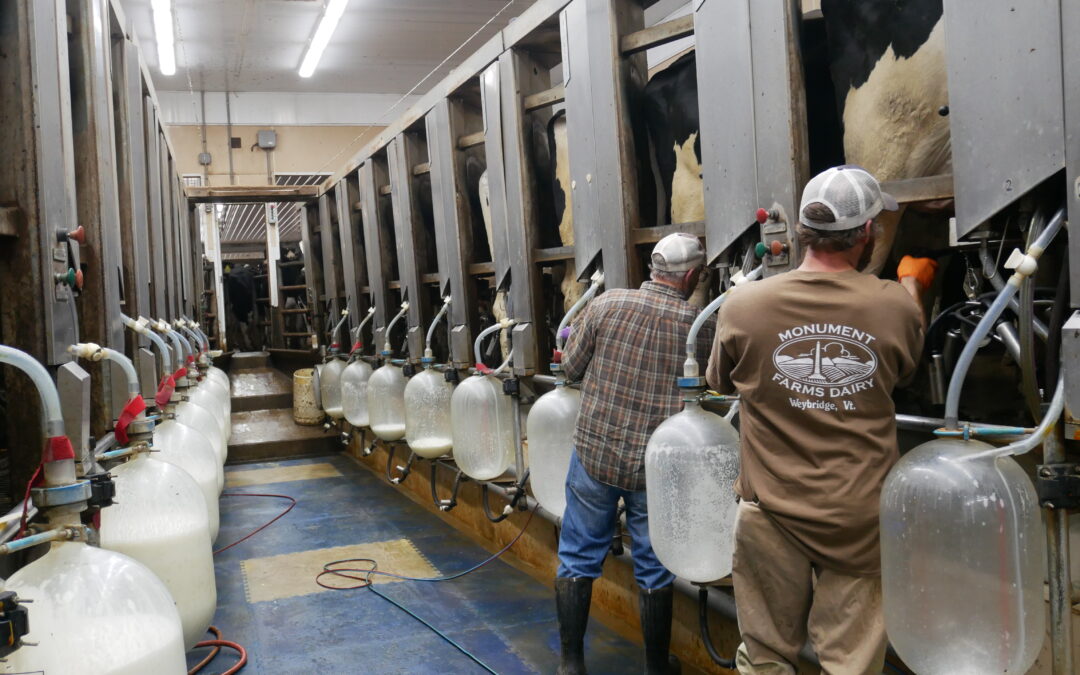The farmer-owners at Monument Farms Dairy in Weybridge, Vermont, are preparing to tackle one of their biggest challenges – and it’s a problem most business owners wouldn’t mind having.
“We’re always faced with having more people wanting our product than we’re able to supply,” Jon Rooney said as he described the steady demand for Monument Farm’s milk, half and half, and heavy cream products.
The most rewarding part of the business growth, Rooney says, is continuing Monument Farm’s legacy as a family business, which started over 90 years ago with two employees and has grown to 50 today. The question now is how to scale the business and keep the family’s core values intact.
“We definitely take it very seriously, and we take a lot of pride in doing things right – we rarely take the easiest, cheapest route in anything we do, for better or worse, and because of that, the business has grown a lot,” Rooney said, “But we’re at max capacity at the processing plant and the farm.”
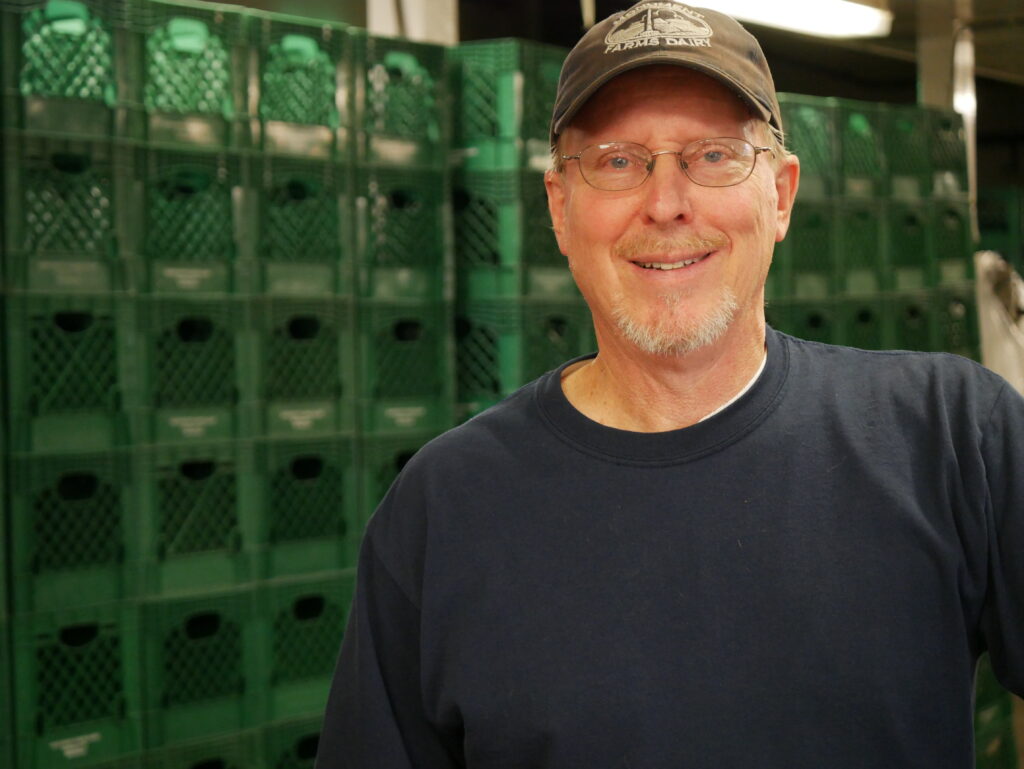
All in the Family
The grandson of the farm founders, Richard and Marjory James, Rooney is one of three grandsons and three great-grandsons currently running Monument Farms Dairy. Rooney’s mother, Millie Rooney and his Uncle Stephen James, passed the farm down to Rooney and his cousins, Peter James and Bob James, who now share ownership with their children.
Rooney says for the past ten to 15 years, the milk volume sold collectively between all their products has increased by three to seven percent each year. All the while, the farm has kept a consistent number of milking cows, between 500 and 540. Rather than adding more cows, they’ve been able to slowly increase production by improving how the farm is managed.
“Diet is everything. Good nutrition helps us keep up with production with the same number of cows, as well as a focus on genetics and feed management,” Rooney said. “It’s not like we’re milking three times a day; we only milk twice daily, and we certainly don’t use rBST. It’s a matter of giving the cows what they need to do their best.”
When the farm was established in 1931, it had just 20 cows and 29 acres. Milk was bottled in the farmhouse basement and sold directly to local businesses and residents in glass bottles.
Today, the operation produces and processes nearly two million gallons of milk every year under the Monument Farms brand, a private label for Mansfield Dairy, and the Vermont Co-op Milk brand for City Market and Hunger Mountain and Middlebury Co-ops.
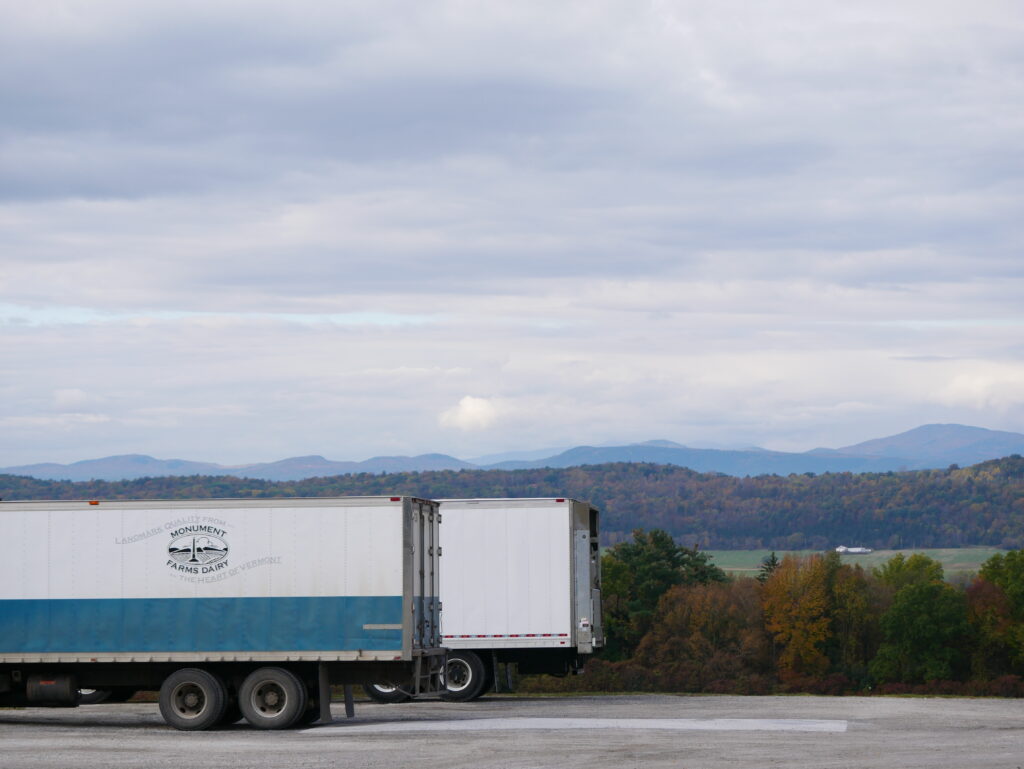
Room for Growth
When a planned farm and processing plant expansion is complete, Rooney estimates they’ll increase production from two to three million gallons per year.
“It’ll enable us to expand our distribution across Vermont and certainly into larger areas like Burlington because there are a ton of stores there we can’t currently cover,” Rooney said.
Construction is expected to begin in 2024 on a new barn adjacent to the current barns on Route 23, allowing the farm to milk 800 cows in total. Rooney says it will be a slow ramp-up to ensure they can handle the processing capacity because they market their milk themselves.
“Since we aren’t part of a co-op, the tanker truck doesn’t show up and take all the milk away. When we’re marketing ourselves, it all has to balance out here,” Rooney said.
Once the barn is complete, a new processing plant will be the next step, with more automation. Right now, the packaging of products is labor-intensive and manual.
“We try to make sure everything we do isn’t catching us up to where we are now but enabling us to look ahead. As every businessperson knows, costs always go up in one way or another, and you can’t just flatline,” Rooney said.
Their adaptability and willingness to innovate helped Monument to keep their business going through the COVID-19 pandemic. Before 2020, drivers would manually check inventory at stores they delivered to and restock the shelves accordingly. Now, Monument has an online system. Store managers place their orders in advance, and Monument staff pick and pack the products at the processing plant.
“It’s enabled us to greatly increase the number of deliveries we can make a day,” Rooney said.
The updates are examples of ways Rooney and his cousins Peter and Bob James, all in their 60s, are working to set the fourth-generation owners up for success.
“We’re all realizing we’re getting older, and there are a lot of changes we want to get in place before we exit,” Rooney said.
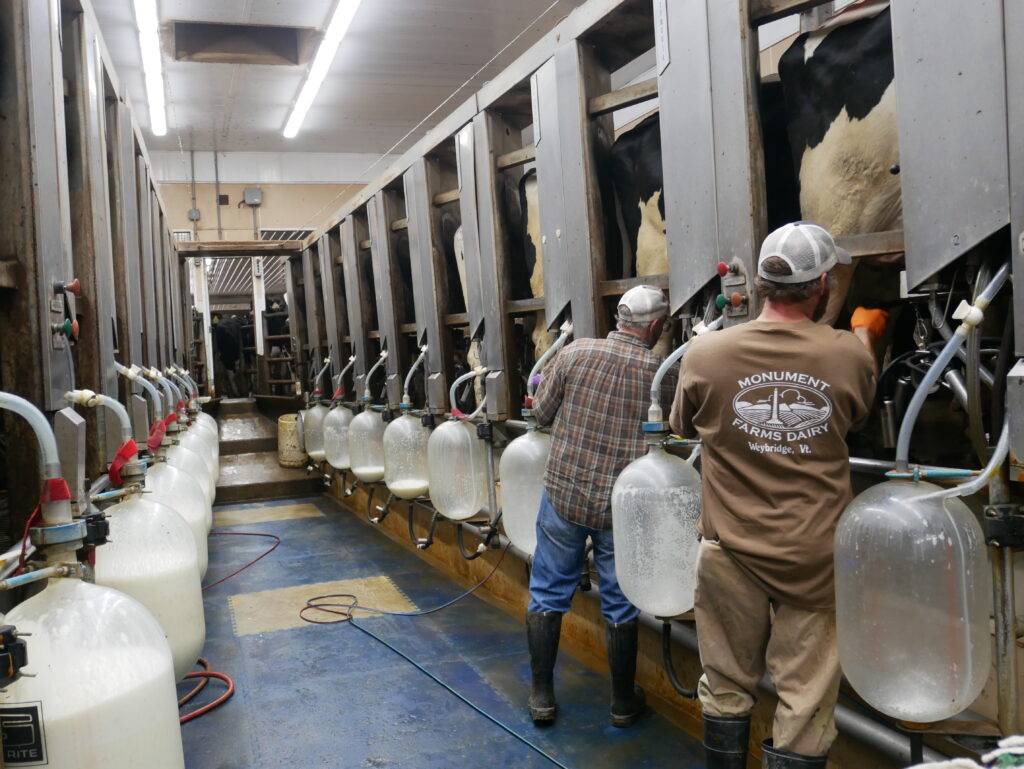
Sustainable Growth to Meet Consumer Needs
Bob, Jon, and Peter are passing along their business niches to the next-generation family trio. Peter and his son Tyler focus on the farm operations. Jon oversees the farm’s onsite milk processing plant and it’s not yet clear who will take on that task when he retires. Bob focuses on distribution with his son Dan, and his other son Ben handles mechanics, including maintaining the farm’s anaerobic digester.
The digester processes cow manure for 21 days, producing and burning methane and then converting it into electricity. The by-product is a dried, bacteria-free bedding material, eliminating the need to purchase cow bedding or electricity.
“When we’re making good gas, and everything is working, we produce more power than our whole business utilizes,” Rooney said. The green energy produced from the digester is just one example of how Monument strives to make their farm as efficient and well-managed as possible.
In the barns, Matt Bull, Monument’s independent dairy nutritionist, works closely with Peter and Tyler. They develop the cow, heifer, and calf diets to maintain herd health and maximize production. Once Bull has developed a diet for Monument, he sends it to Phoenix Feeds and Nutrition. Phoenix has provided feed supplements for Monument’s herd for over a decade.
“Because we’re packaging under our own name, we try to achieve consistency in the feed, so the flavor is not changing dramatically,” Rooney said. “With Phoenix, they’re consistent and reliable, and that translates to flavor and consistent production on the part of the cows.”
It is perhaps why Monument can barely keep the shelves stocked, or why their chocolate milk has a cult-like following. As they expand, Rooney says they’ll look at other flavored milk options that, in the land of maple, could be even more popular than chocolate.
“If we can build a new plant and put in different equipment, it will allow us to make different specialty fluid milk, and maple would certainly be near the top of the list,” Rooney said while noting that their biggest goal is to create products people want to enjoy again and again. “People like to know that each container of milk they get is going to taste as good as the last one, and that is everything.”
To learn more about how working with Phoenix Feeds can help you boost farm profitability, contact us for a consultation.
